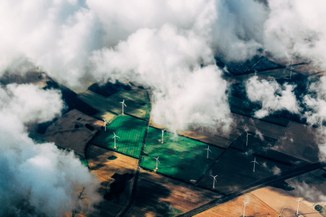Mission Statement
 Geographical Transformations in Research and Teaching
Geographical Transformations in Research and Teaching
We understand geography as the discipline studying the interactions and feedbacks between people and their natural and built-up surroundings. Conducting research across the globe, we apply and develop qualitative and quantitative methodologies, theories and educational programmes in order to achieve a better understanding of how these interactions take place and to what effect. This involves studying the multiple, shifting geographies of coupled human-environment systems and how they contribute to processes of global change, notably climate change, land-use change, globalization, urbanization and biosphere change. Fundamental to our research is the recognition that flows of materials, energy, people, information, ideas and capital are increasingly transgressing traditional notions of the global and local, the urban and rural, and the human and natural. This has created a need for novel theoretical and methodological approaches for analysing causal relations, for revealing spatial issues of scale, territory and place and for understanding change, tipping-points and transformations in human-environment relations. Bringing together the various sub-disciplines represented in our department, we work to the overarching research question:
How can geography enable a better understanding of contemporary human-environment?
Two thematic research groups address this question: The Land Systems Research Group and The Urban Research Group. Encompassing researchers at all career stages, from students to senior scientists, the two groups encourage and facilitate respectful intellectual contestation. We strongly believe that new understandings and approaches for studying and teaching geographical transformations emerge precisely at the point of epistemological and ontological friction. Embracing this academic agenda, the Geography Department at Humboldt-Universität zu Berlin represents a challenging but stimulating academic environment at the forefront of research on systemic global transformations in the ways that human beings perceive, use and transform the planet.
The Land System Research Group
|
The Urban Research Group
|
|
|
Land use is a principal factor underpinning global environmental change. Understanding why and where land-use change occurs, how it affects the Earth’s surface and its ecosystems and how these changes impact upon societies lies at the heart of many sustainability challenges. Land systems, and the relationships between people and nature within them, are transforming rapidly as globalization increasingly connects distal places via flows of materials, people, information, technologies and capital, resulting in the increasing decoupling of local land use and places of consumption. New actors, such as NGOs or large investors, are entering the scene, land values are changing dramatically and new land uses, such as conserving lands for ecosystem services, are gaining importance rapidly. In the wake of increasing urbanization, the relations between cities and their hinterland and the role of cities in land systems are transforming. As competition for land intensifies, individual plots of land are becoming sites of socio-political and economic contestation, raising important questions of justice, equity, participation and land ethics. Moreover, even where land is not used directly, ecosystems are transforming, for example due to climate change fueled by land-use change elsewhere. In combination, these issues call for new theoretical and methodological approaches to analyse causal relations in land system dynamics and their impacts on societies and the environment.
The Land Systems Research Group approaches these challenges by identifying the key drivers, geographical patterns and impacts of land change – including feedback mechanisms, and multidirectional flows of energy or matter over distance. To tackle these issues the Land Systems Research Group combines concepts and methodologies of place-based land research, such as field experiments, remote sensing and geoinformation science, geospatial statistics and analyses, and process-based spatial modelling, as well as approaches focusing on linkages and networks of interaction, such as global value chain analyses, network analyses, assessments of environmental justice, sustainability and sociocultural understandings of globalization, and the telecouplings concept. Within this remit the Land Systems Research Group focusses on select topics and processes studied in key areas of land-use change across the globe, such as Southeast Asia, Latin America, Eastern Europe and the former Soviet Union. |
The world is urbanizing and, globally, more people are now living in urban than in rural areas. Urban areas have increasingly large ‘footprints’, drawing natural resources into urban settings from across the globe. For example, an urban, culturally defined desire for ecologically certified coffee or more meat-rich diets causes rural land-use change on a global scale. Increasing trade linkages, multi-sited households, people living urban lives in so-called rural areas (and vice-versa) challenge the conventional logic of the urban as conglomerations of build-up, inhabited areas. A central question of the Urban Research Group is, therefore, how to measure, determine, understand and explain ‘the urban’.
The Urban Research Group believes that engaging with ‘the urban age’ starts with the development of theoretical concepts, research questions and mixed methodologies capable of capturing the complexity of urban systems. The group explores this complexity by way of a combination of methods, spanning the qualitative (e.g., interviews, surveys, participant observation) and quantitative (e.g., field measurements, remote sensing, GIS, geospatial modelling, statistics). Geographically, the group focusses primarily on Berlin, an illuminating urban-regional context with a long research tradition at the Geography Department, studying topics such as environmental justice, healthy living environments, urban ecosystem services (including soils and urban micro-climates), gentrification, urban agriculture, urban infrastructures and urban planning. This is complemented by urban research in the Global South, for example in Latin America, Sub-Saharan Africa and South East Asia, where urban sprawl and informal settlements are transforming natural resource and land use, prompting environmental and human health trade-offs. The Urban Research Group assesses these issues, aspiring to overcome, in innovative ways, data gaps in terms of censuses, maps and planning initiatives, but also of socio-cultural and political contexts of action. |


